Recently, Poets & Writers awarded one poet and one fiction writer with a trip to New York to meet with editors, agents, and other literary professionals as part of the California Writers Exchange contest. The winning poet, Xochitl-Julisa Bermejo of Los Angeles, blogs about her experience from NYC. (Stay tuned for a post from winning fiction writer Laura Joyce Davis as well!)
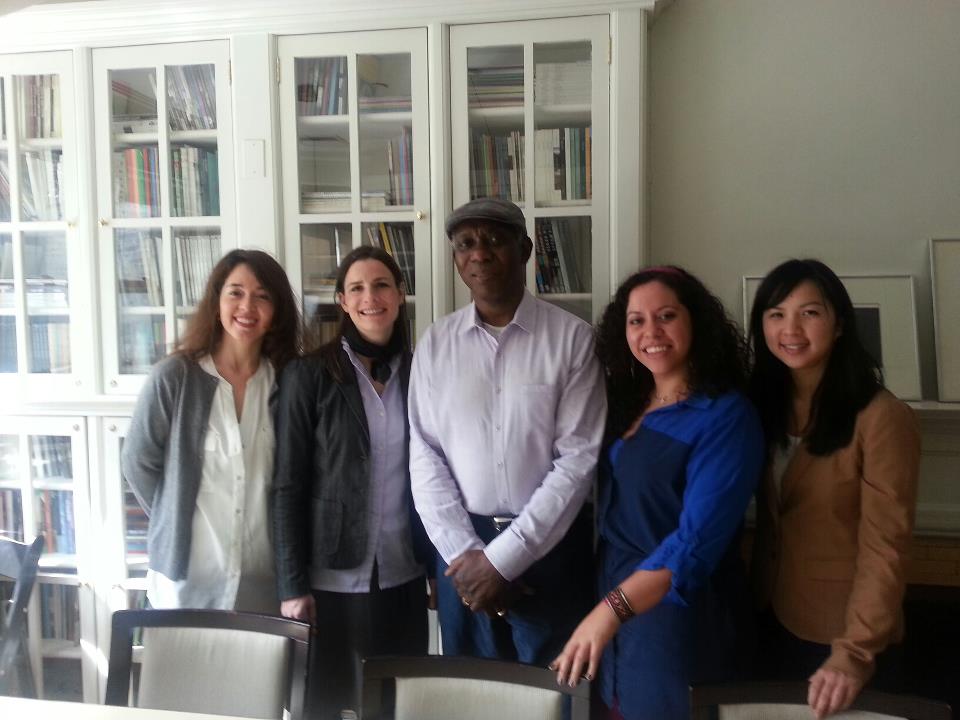 It is now 4:41 p.m., I’m sitting in my room on the seventh floor of the Gershwin Hotel in Midtown, and I have to be in the lobby ready to go to my first New York reading by 6 p.m. I got back to my room at 10:30 last night after a delicious Indian dinner with Yale Younger Poet Eduardo C. Corral, my fellow contest winner Laura Joyce Davis, and staff from Poets & Writers. Eduardo laughed at the lamb chops I ordered over dinner: “You know how to do it.”
It is now 4:41 p.m., I’m sitting in my room on the seventh floor of the Gershwin Hotel in Midtown, and I have to be in the lobby ready to go to my first New York reading by 6 p.m. I got back to my room at 10:30 last night after a delicious Indian dinner with Yale Younger Poet Eduardo C. Corral, my fellow contest winner Laura Joyce Davis, and staff from Poets & Writers. Eduardo laughed at the lamb chops I ordered over dinner: “You know how to do it.”
But now I have only a little over an hour before I must make my way through the cold and ugly rain that has burst onto Manhattan Island today in order to get to the Center for Fiction for the reading. This is how the trip has been since we landed Sunday night: a whirlwind, a storm.
So what do I say? I can say that spending the last two days talking poetry and literature with fabulous people over fabulous food has been, well, fabulous. A definite highlight was sharing a glass of wine with Yusef Komunyakaa at a little corner café and as we talked about theatre, Son Jarocho, and poetry. But so much of this trip has been a highlight. Getting to sit in on a meeting with a real New York lit agent with a no-bull attitude, papers on her desk piled to her chin, was other-worldly. It has all felt unreal, and every once in awhile I have a little giggle to myself and think, I can’t believe this is happening.
Eduardo C. Corral talks about running in the cotton fields around his home in Casa Grande, Arizona, as a child and imagining it was snow. He remembers shivering in the middle of August and even asking his mother for a coat. Matthea Harvey remembers chasing fairies in the hedges around her house, and fantasizing about glow-in-the-dark teddy bears that she wished were hers. Yusef Komunyakaa shares a story about watching an eighty-year-old woman dance Son Jarocho and believes it is the first time he has seen duende in the flesh. These are the memories I will take back to Los Angeles with me.
But then there is the quiet moment I enter my hotel room and throw off my coat. The moment I am alone, and my heart and eyes almost instantaneously swell. I breathe and really take in everything that has been going on around me. I’m truly lucky to have this moment and all the moments that brought me to this one. And I can’t stop feeling thankful. Thankful to Poets & Writers, thankful to my friends who keep texting me good luck for tonight, to the L.A. poets that always have my back, to my parents who have always encouraged me pursue my dreams. I feel like a silly little girl, but all I can really say right now is thank you.
And, just for something a little fun, here are two questions I’ve been asking everyone, along with their answers.
Q: As a reader, what is the first book you remember getting swept up in?
Deborah Garrison (literary editor at Knopf and Pantheon): It’s a little embarrassing, but The Long Winter by Laura Ingalls Wilders. I’m rereading it right now with my youngest. I’ve read it at least eight times.
Eduardo C. Corral (poet): To Kill a Mockingbird by Harper Lee.
Gail Hochman (literary agent): Little Women by Luisa May Alcott. No question about it.
Matthea Harvey (poet and children’s book author): Fantastic Toys by Monika Bisner. I remember lying in bed and wondering if I could have one toy, which one would I choose?
Q: Besides reading and writing, what is an activity that is important to your writing?
Deborah Garrison: Commuting, walking. There are not a lot of places that I can be contemplative. Walking the dog; times when I am unplugged.
Yusef Komunyakaa (poet): Maybe shooting pool.
Eduardo C. Corral: For me, in New York City, walking around, listening, dragging your finger against a wall. Being in the city.
Matthea Harvey: Going to art museums and galleries. Walking around the city. Taking photographs of nothing particular.
Photo: From left: P&W staff member Jamie FitzGerald, Laura Joyce Davis, Yusef Komunyakaa, Xochitl-Julisa Bermejo, and P&W Staff member Cathy Linh Che.
The California Writers Exchange contest is made possible by a generous grant from the James Irvine Foundation. For more information on the contest, visit here.





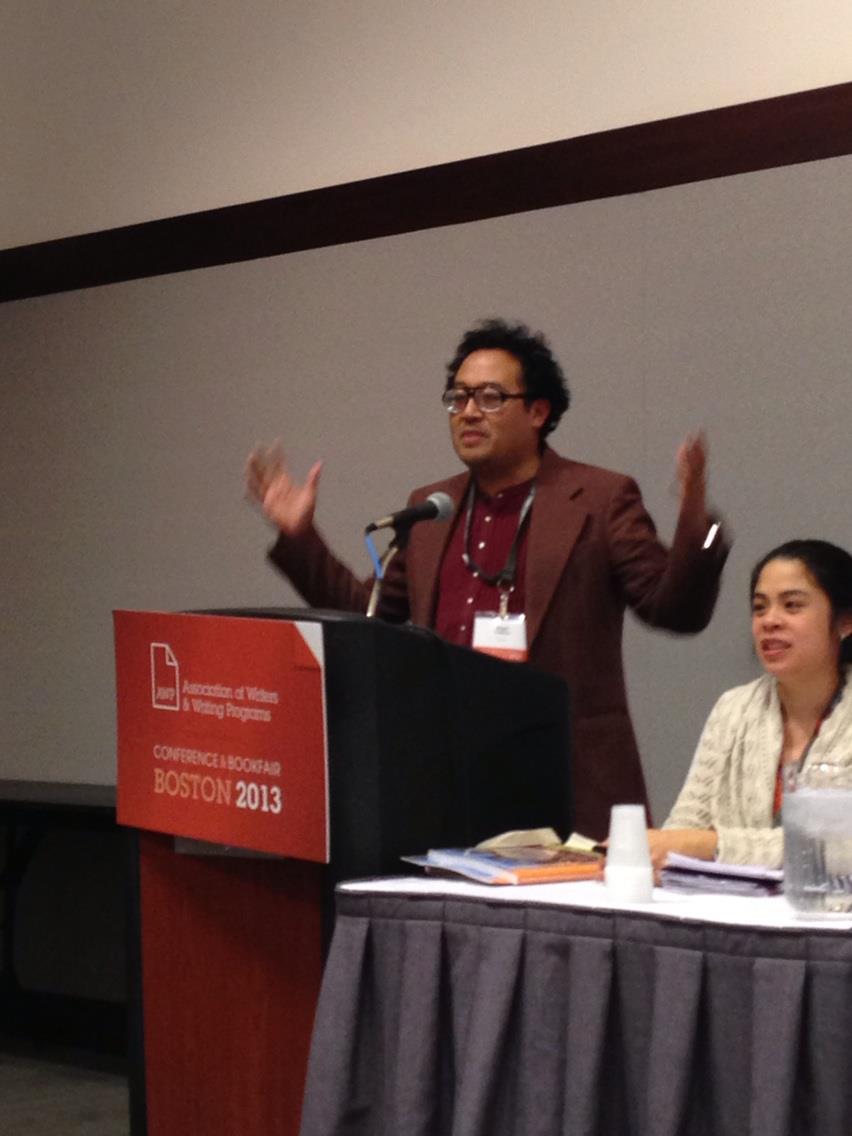
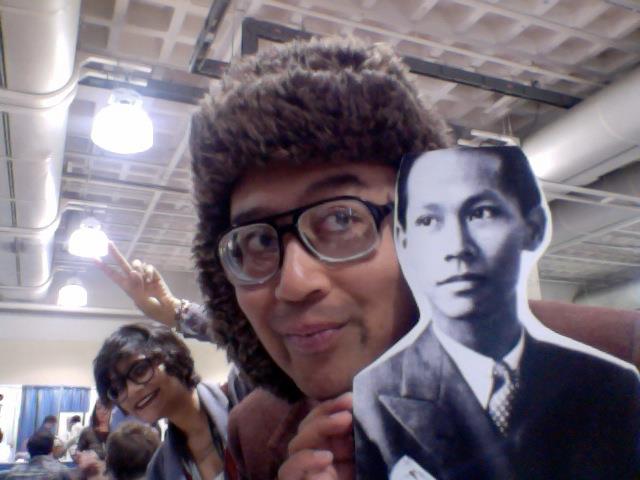 light to Madison will be on time. I am scheduled to perform at the Midwest Filipino Students Association. I am to give a workshop and a performance in the evening. I bring my bags to Friday morning's Kundiman panel. Myung Mi Kim, Paisley Rekdal, and I read poems and talk about pedagogy.
light to Madison will be on time. I am scheduled to perform at the Midwest Filipino Students Association. I am to give a workshop and a performance in the evening. I bring my bags to Friday morning's Kundiman panel. Myung Mi Kim, Paisley Rekdal, and I read poems and talk about pedagogy.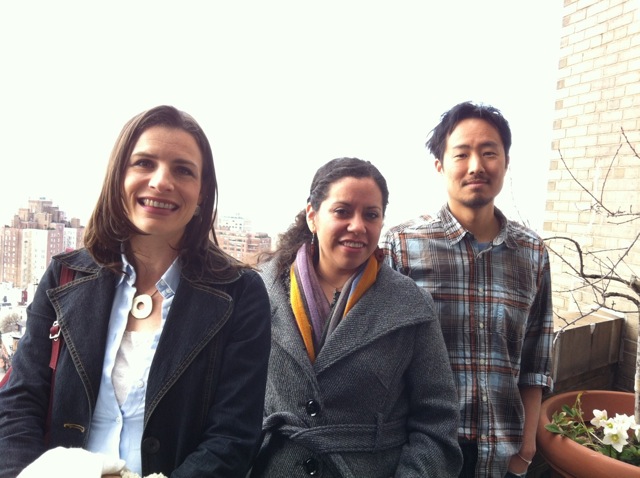 I am so grateful to Poets & Writers for the once-in-a-lifetime experience of the California Writers Exchange! I heard people say this week that there’s no mystery in publishing, but for those of us not in New York, it can feel mystifying. In an attempt to pull back the curtain and share what I’ve learned, I give you my Top Ten Things Every Writer Should Know:
I am so grateful to Poets & Writers for the once-in-a-lifetime experience of the California Writers Exchange! I heard people say this week that there’s no mystery in publishing, but for those of us not in New York, it can feel mystifying. In an attempt to pull back the curtain and share what I’ve learned, I give you my Top Ten Things Every Writer Should Know: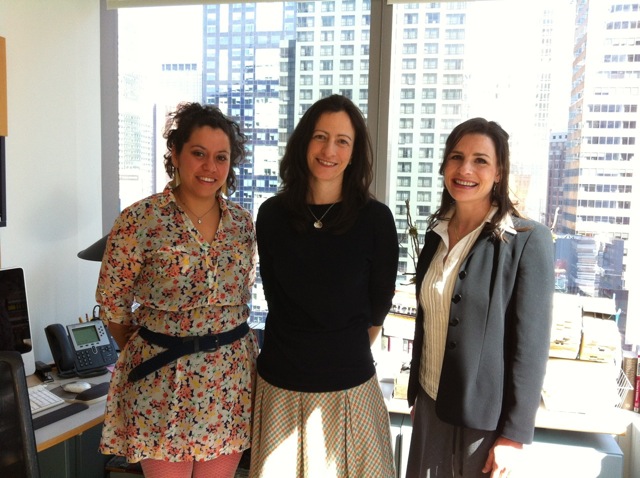 The invaluable gift this trip has given me is confidence to know that I am moving in the right direction, and that as long as I keep working on my writing, I will reach my goals. Being able to walk into the offices of The New Yorker has been a crazy experience, but it has also shown me that everyone is in this “business” because they love books, and everyone works extremely hard to put out their best work because of that love. Often this work will be thankless, but as New Yorker fiction editor Deborah Treisman told me, “Don’t be afraid to be rejected.”
The invaluable gift this trip has given me is confidence to know that I am moving in the right direction, and that as long as I keep working on my writing, I will reach my goals. Being able to walk into the offices of The New Yorker has been a crazy experience, but it has also shown me that everyone is in this “business” because they love books, and everyone works extremely hard to put out their best work because of that love. Often this work will be thankless, but as New Yorker fiction editor Deborah Treisman told me, “Don’t be afraid to be rejected.” 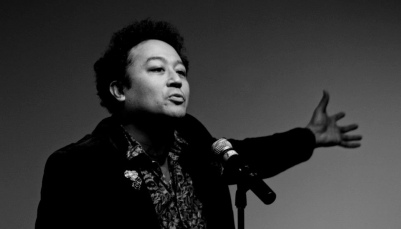 For the last three years, I have been working with the D.C. Commission for the Arts on Poetry Out Loud, A National Poetry Recitation Competition. This year, I have worked primarily with McKinley Technological High School and Latin Public Charter School. My job is to help students find their unique interpretations of poetry selected by Poetry Out Loud. The competition goes from local high school, to the state level, and then to the national competition.
For the last three years, I have been working with the D.C. Commission for the Arts on Poetry Out Loud, A National Poetry Recitation Competition. This year, I have worked primarily with McKinley Technological High School and Latin Public Charter School. My job is to help students find their unique interpretations of poetry selected by Poetry Out Loud. The competition goes from local high school, to the state level, and then to the national competition.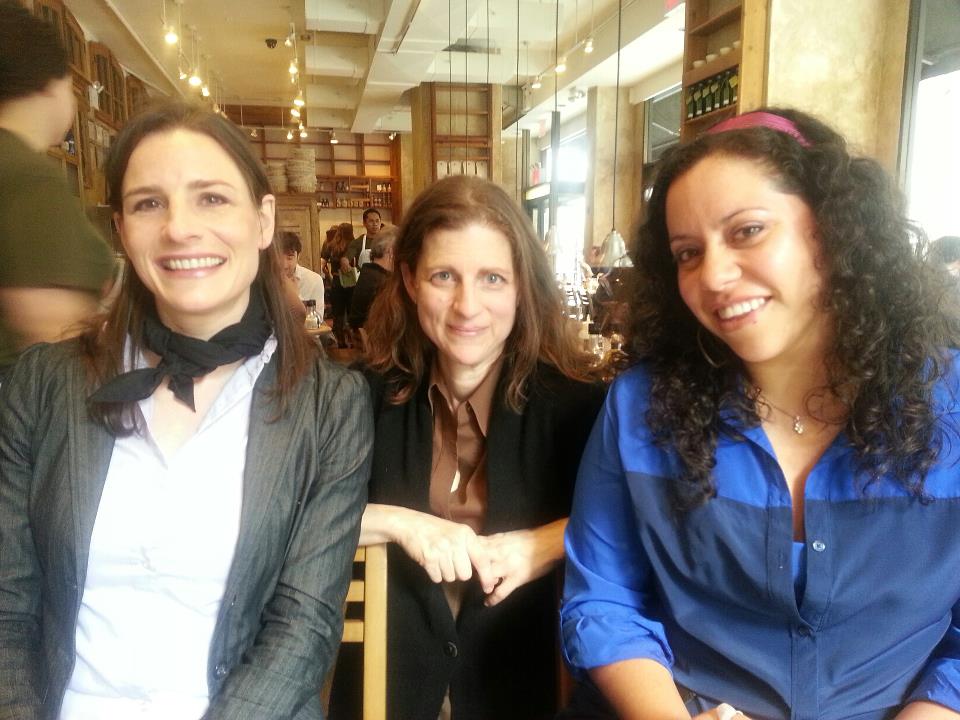 I am living a writer’s dream.
I am living a writer’s dream.  It is now 4:41 p.m., I’m sitting in my room on the seventh floor of the Gershwin Hotel in Midtown, and I have to be in the lobby ready to go to my first New York reading by 6 p.m. I got back to my room at 10:30 last night after a delicious Indian dinner with Yale Younger Poet Eduardo C. Corral, my fellow contest winner Laura Joyce Davis, and staff from Poets & Writers. Eduardo laughed at the lamb chops I ordered over dinner: “You know how to do it.”
It is now 4:41 p.m., I’m sitting in my room on the seventh floor of the Gershwin Hotel in Midtown, and I have to be in the lobby ready to go to my first New York reading by 6 p.m. I got back to my room at 10:30 last night after a delicious Indian dinner with Yale Younger Poet Eduardo C. Corral, my fellow contest winner Laura Joyce Davis, and staff from Poets & Writers. Eduardo laughed at the lamb chops I ordered over dinner: “You know how to do it.”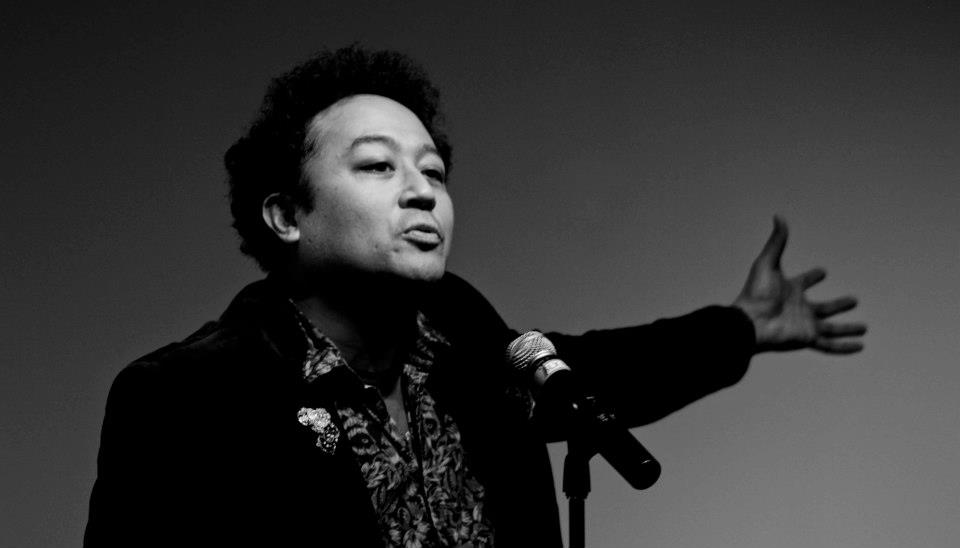
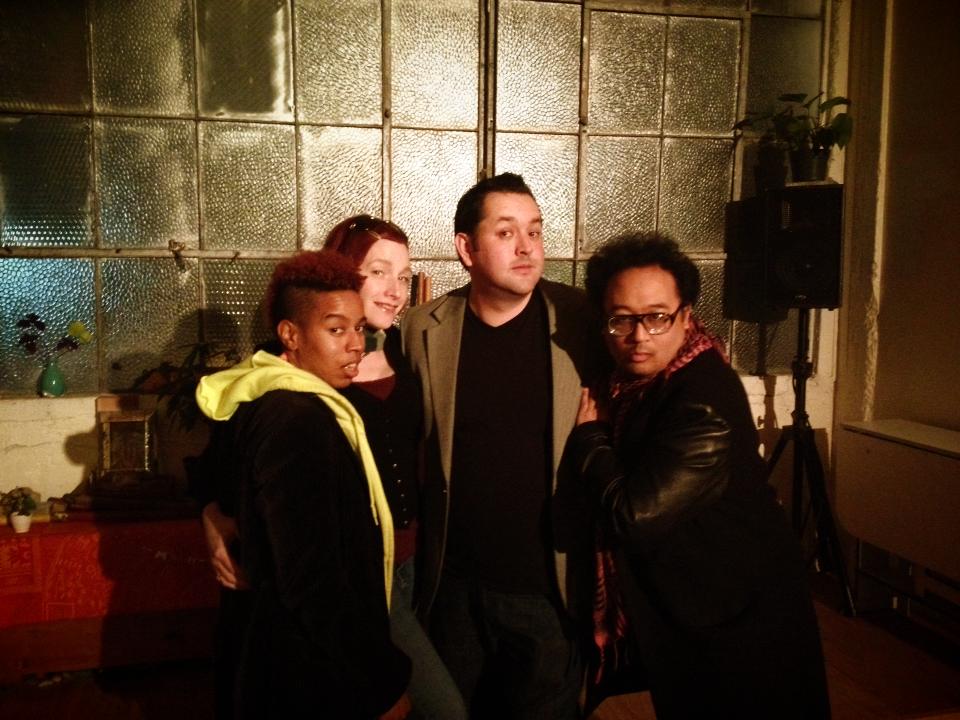 Mase’s poem “Neighbor” was a big hit. The poem is about a homophobic neighbor who gives Mase nasty stares: “Queer people fuck better...and you know it because you live next door...to me.” Baruch’s poem on being “thin” is the best queer poem on body image: “If I were thin I would move a pile of needles naked from one room to another...and sleep with so many skinny boys in my bed because I’d be thin and we can lie in a line on the bed...” Natasha Muse broke her stand-up set into progressions during which she spoke of coming out as trans, starting out as Ewan McGregor and then ending up looking like Nicole Kidman, so watching Moulin Rouge hits her in a very personal way. Natasha concluded her set by talking about becoming a mom and living with her female spouse. The evening had some of the best comedic queer material that I have come across. The owner of The Living Room Project, Micah Hobbes, was impressed by the talent and acknowledged humor as a healing tool.
Mase’s poem “Neighbor” was a big hit. The poem is about a homophobic neighbor who gives Mase nasty stares: “Queer people fuck better...and you know it because you live next door...to me.” Baruch’s poem on being “thin” is the best queer poem on body image: “If I were thin I would move a pile of needles naked from one room to another...and sleep with so many skinny boys in my bed because I’d be thin and we can lie in a line on the bed...” Natasha Muse broke her stand-up set into progressions during which she spoke of coming out as trans, starting out as Ewan McGregor and then ending up looking like Nicole Kidman, so watching Moulin Rouge hits her in a very personal way. Natasha concluded her set by talking about becoming a mom and living with her female spouse. The evening had some of the best comedic queer material that I have come across. The owner of The Living Room Project, Micah Hobbes, was impressed by the talent and acknowledged humor as a healing tool.